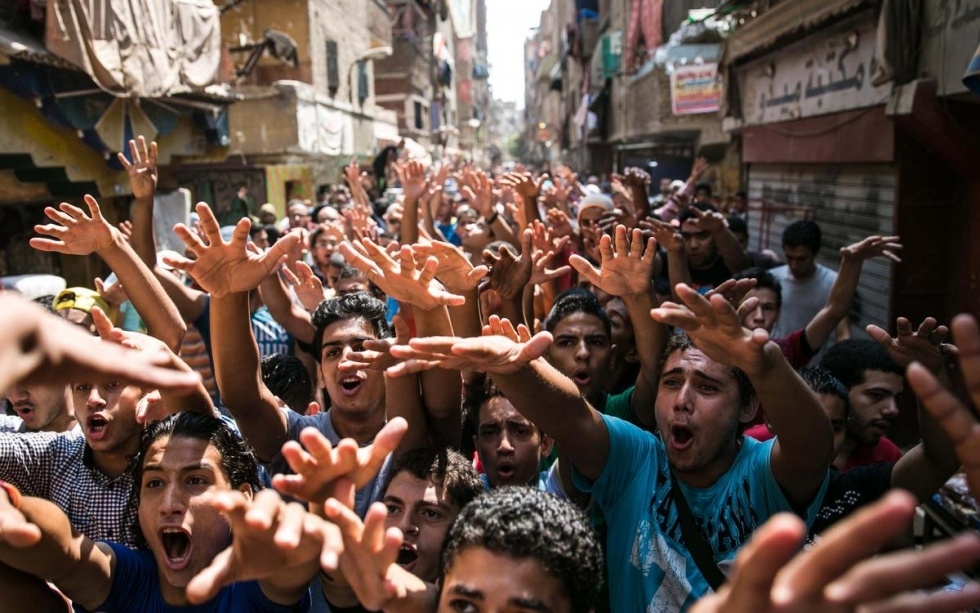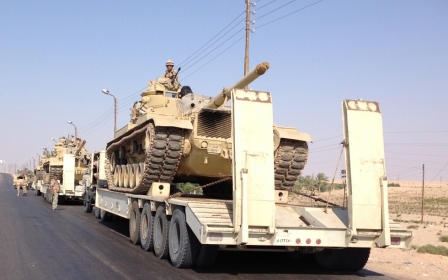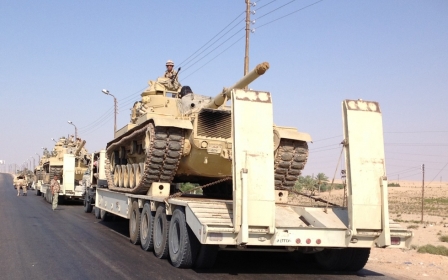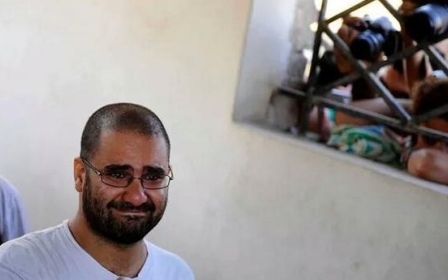Protests spread across Egypt in commemoration of Sisi's first 100 days

Dozens of protests spread across the country on the first Friday since the commemoration President Abdel Fatah al-Sisi’s first 100 days in power.
“Protests began on Friday morning in most of Egypt’s towns and villages while larger demonstrations took off from mosques after Friday prayers,” said Islam Tawfiq, one of the demonstrators in Cairo.
Demonstrators’ chants are coloured with a range of demands and condemnations: down with the military, freedom for political prisoners, a change in the deteriorating standards of living and increasing prices and an end to the regular power cuts, demonstrators in Egypt told MEE.
“What’s becoming more popular now is that protesters make an oath at each demonstration promising to continue the revolution and achieve the 25 January revolutionary demands as well as take vengeance for all martyrs and political prisoners,” said Diaa Sawy, spokesperson for the coalition for Youth against the Coup.
Several observers have seen the former field marshal to have brought economic and diplomatic development as well as hope to the Egyptians after a tumults three years since the ouster of Mubarak in 2011. They also reported deteriorating human rights and political freedoms however.
In July Sisi’s cabinet raised fuel prices in order to curb consumption and trim the government’s budget deficit. The president also launched a $4 billion project to double the capacity of the Suez Canal, a major economic earner.
However protesters say that the majority of the Egyptian people are frustrated by the lack of change witnessed since Sisi came to power.
“There is a visible increase in the use of slogans that relate to social issues such as the deterioration of the economy and rights for the poor,” said Sawy saying that power cuts and rising prices have disillusioned many of those who previously supported the military take-over in Egypt.
According to Sawy, the number of protesters coming out to the streets is much higher this Friday, with the largest demonstrations in Cairo taking place in the eastern suburbs of the city and in Alharam in Giza.
A protest Law was issued by Hazem el-Beblawi’s cabinet in November 2013 to “regulate” protests, by making it a requirement to seek permission from the Ministry of Interior to organise demonstrations. The law was then retracted for public discussion and subsequently approved in late November 2013 by former interim president Adly Mansour.
The legislation includes restrictions on protests, marches and public meetings and requires a three-day notice for protests. It allows the Minister of Interior to move or change the route of assemblies or cancel them.
Articles in the Law also allow security forces to use water cannons, batons, teargas, rubber bullets and metal pellets to disperse protesters.
Since the Law was issued, a number of students and activists have been detained on charges of violating the controversial law and illegal assembly.
As demonstrations become increasingly risky forms of dissent, Egyptians have developed new ways to overcome the regimes' methods to crackdown on opposition.
“The new strategy is instead of having a small number of huge protests, we are now holding many smaller protests to make it harder for the police and army to crackdown on us,” said 20-year-old Tamer (not his real name) from Cairo.
The Egyptian government has portrayed the Muslim Brotherhood as the main threat to Egypt’s stability and has moved to curb one of the last bastions of group’s dissent using new rules to curtail protest at Al Azhar University on Thursday.
Yet members of the national coalition for legitimacy – a group of diverse social and political currents which was established after the July 2013 military coup – a main force calling for the protests in Egypt today, say the Egyptian opposition is more representative of Egypt’s different social strata.
“Everyone is out there… [but] it is the youth and students - who are not part of any particular political party – who are the ones leading Egypt’s protesters today. The Muslim Brotherhood only constitutes 20% of the protesters,” Sawy told MEE.
Sisi however is not only curbing political freedoms by curtailing demonstration rights, his government has also moved to controlling dissent through the Internet.
The Egyptian government hired the sister company of a US-based security firm for extensive monitoring of Internet communication on various social platforms such as Skype, Facebook, Twitter, and YouTube, the state-owned Al-Ahram Newspaper reported on Thursday.
Middle East Eye propose une couverture et une analyse indépendantes et incomparables du Moyen-Orient, de l’Afrique du Nord et d’autres régions du monde. Pour en savoir plus sur la reprise de ce contenu et les frais qui s’appliquent, veuillez remplir ce formulaire [en anglais]. Pour en savoir plus sur MEE, cliquez ici [en anglais].




